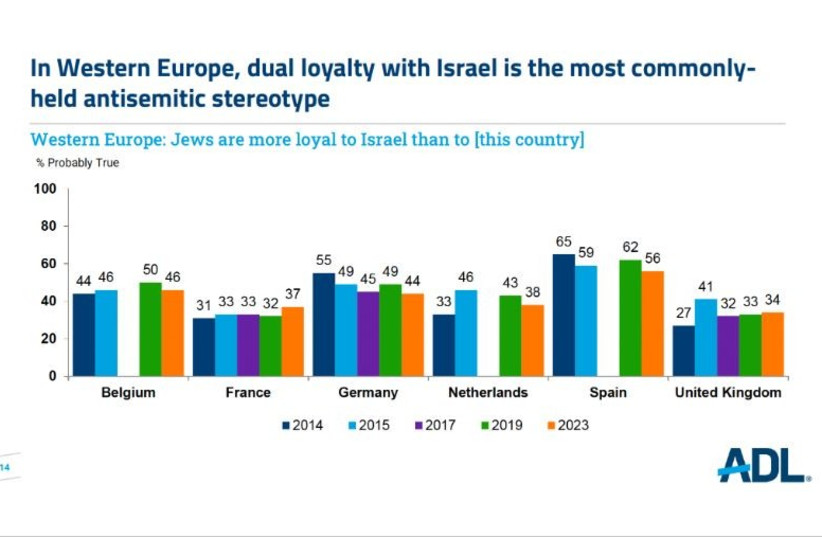 ADL data shows antisemitism is deeply entrenched in Europe. Here’s what needs to happen now
ADL data shows antisemitism is deeply entrenched in Europe. Here’s what needs to happen now
JONATHAN GREENBLATT
Belief in antisemitic stereotypes can be countered through education about the Jewish people, the history of the local Jewish community and antisemitism.
.

(photo credit: ADL)
There’s no question that people of good conscience are alarmed by intensifying antisemitism around the world. The signs are everywhere: more antisemitic assaults, increased expressions of anti-Zionism and more anti-Jewish vandalism. But to truly understand the scope of the problem, we need data on incidents, security, how prejudice affects Jewish communities in the diaspora and how non-Jews perceive Jews.
The Anti-Defamation League (ADL) has been a data-driven organization for generations because it knows data drives policy. By understanding the pervasiveness of antisemitism and how it manifests, we can focus on governmental and societal action to combat it more effectively. An evidence-based approach avoids hyperbole and squarely focuses on the facts.
For this reason, the ADL just released new research on antisemitic attitudes among the general populations in 10 European countries: Belgium, France, Germany, the Netherlands, Poland, Russia, Spain, Sweden, the UK and Ukraine. The findings confirmed what we long understood: antisemitism remains deeply entrenched in Europe. Roughly one out of every four residents agreed with a majority of harmful stereotypes about Jews. The news would be shocking if it was not so predictable.
First conducted in 2014 across 102 countries, the ADL Global 100 Index survey consistently has provided insights into national and regional attitudes about Jews, beliefs in antisemitic stereotypes, and knowledge of the Holocaust. Follow-up surveys in select countries continue to reveal important findings. For this reason, Global 100 data is regularly utilized by policymakers, academic researchers, journalists, Jewish communities and others around the world.
What did the latest ADL survey say about antisemitism?
In our latest survey, the ADL found that antisemitic attitudes remain higher in the four Eastern European countries it polled (Hungary, Poland, Russia and Ukraine) compared to countries in Western Europe. While the results from Western Europe remained relatively consistent with prior surveys, it was good to see lower antisemitism scores in Eastern Europe. However, overall antisemitic attitudes remain higher in the East compared to the West, exceeding one in three respondents in Hungary and Poland.

A bright spot in the survey results was Ukraine. The country registered a 17% drop in its Index score, from 46% to 29%. One possible explanation is the courageous leadership shown by Ukraine’s Jewish president, Volodymyr Zelensky, in the face of Russia’s cruel war of aggression against Ukraine and the public support he has received from Ukrainians.
Elsewhere, despite recent commitments from many European governments to address antisemitism, our data confirms the persistence of anti-Jewish attitudes.
In Western Europe, the dual loyalty trope is the most pervasive antisemitic stereotype. Wide swaths of the population believe that Jews are more loyal to Israel than their own country. More than half of Spaniards (56%) believe this is “probably true,” as do 46% in Belgium, 38% in the Netherlands, 37% in France, and 34% in the UK.
In Eastern Europe, the dual loyalty canard is even more prevalent, with 62% in Poland agreeing, 48% in Hungary, 38% in Ukraine and 36% in Russia.
HOLOCAUST AWARENESS is universal across Europe, but Holocaust denial is markedly higher in Eastern Europe. In Hungary and Ukraine, 19% of those polled agree that “the Holocaust is a myth and did not happen,” or say the numbers of Jews who died were greatly exaggerated. In Russia and Poland, those denying the Holocaust were at 17% and 15%, respectively.
Just a few days ago, the United States issued its first-ever National Strategy to Counter Antisemitism. So too, have a number of European governments. Like America, nearly all use the International Holocaust Remembrance Alliance (IHRA) working definition of antisemitism as their guidepost for understanding antisemitism.
And yet, success requires constant vigilance and an unflinching commitment to convert smart strategies into effective programs that address antisemitism in all its forms – conspiracy theories, Holocaust denialism, fanatical anti-Zionism – all of it.
But action plans must be backed by budgets, otherwise, they little more than empty words. Programs and personnel must be resourced to do the hard work of ferociously fighting hate.
Belief in antisemitic stereotypes can be countered through education about the Jewish people, the history of the local Jewish community and antisemitism. These are key elements to inoculating people against the virus of antisemitism. The ADL sees the fruits of this labor in the schools across America where it works.
In Europe, formal education about the Jewish people is rare. Typically, it is limited to three topics: the Biblical period, the Holocaust and Israel. Studying contemporary Jewish life, Jewish contributions to Europe and how antisemitism is expressed today would diminish antisemitic attitudes. This is why the ADL has begun to export our award-winning antisemitism education programs to European countries, including France and the UK.
Education must not be limited to schools. Workplace education is crucial and governments should make anti-bias education, including against antisemitism, mandatory for public sector employees. Diversity, equity and inclusion programs in the private sector also must encompass antisemitism alongside racism and other forms of hate.
In the end, we can’t just hope that the Global 100 will prompt action by governments and other stakeholders. We need to hold them to their word. Accountability and action are essential in the fight against antisemitism.
The writer is the CEO and National Director of the ADL. He will be speaking at The Jerusalem Post Annual Conference on June 5. For more info, visit: www.jpost.com/AC23
Zawartość publikowanych artykułów i materiałów nie reprezentuje poglądów ani opinii Reunion’68,
ani też webmastera Blogu Reunion’68, chyba ze jest to wyraźnie zaznaczone.
Twoje uwagi, linki, własne artykuły lub wiadomości prześlij na adres:
webmaster@reunion68.com
